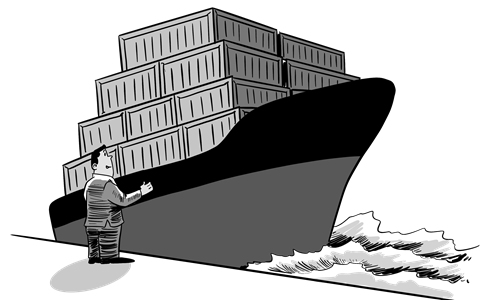HOME >> SOURCE
China should promote high-tech exports
By Mei Xinyu Source:Global Times Published: 2019/12/5 18:43:40

Illustration: Luo Xuan/GT
Should China again call to "make every endeavor to promote exports?" The answer is most certainly yes. Based on current and upcoming domestic and global economic conditions, it's necessary for China to re-emphasize exports, particularly for its high-tech industries. As the world is expected to enter a long low-growth period given the uncertainties that come with long-term trade friction, stabilizing and expanding exports has become the priority of trade policies and will be crucial when it comes to combating external impacts.In November, the manufacturing purchasing managers' index (PMI) from the National Bureau of Statistics (NBS) jumped back above the 50 mark which separates contraction from growth, reversing the May-October downward trend. But that doesn't mean the pressure on China's economy has been relieved entirely. China should remain prepared for a prolonged fight against pressure from the slowdown.
China's macroeconomic policies to boost growth should focus on more positive fiscal policies and measures to expand exports. Positive fiscal policies can boost the fiscal deficit and debt. For emerging economies, a large fiscal deficit and current account deficit often mean a potential financial crisis. Alongside China's positive expansion of its opening-up and imports, the country also needs to expand exports significantly, avoiding large deficits.
High-tech and innovative industries are the pillars of China's industrial upgrading and sustainable economic growth. They are also the focus of the bruising China-US trade war. China should focus on promoting its exports of high-tech products. The nation's high-tech industries have seen great investment in fixed assets during an overall weak investment environment. If these high-tech industries encounter obstacles in sales and the supply of key parts, investments in the sector over recent years will become bad assets, impacting China's financial system.
As China, South Korea and Western countries increase investment in high-tech industries, their economies are in fierce industry-development competition, leading to low capacity utilization in high-tech production. Domestic and overseas information and communications technology (ICT) industries in 2018 widely predicted that the global semiconductor market, among other industrial markets, could experience significant decline in 2019. Thus, a full crackdown on China's high-tech industry will present an opportunity to amplify its competitiveness.
China, India and Japan made huge investments in the tea industry in the 1860s and 1870s. In the late 1870s, China lost its dominance in the international tea trade to India and Japan, devastating the economies of its southeastern provinces. China must make efforts to prevent a similar situation from occurring with high-tech industries.
As the domestic high-tech products market is approaching saturation, its focus should be on the promotion and expansion of overseas markets. This should be clear, particularly amid an overall atmosphere of promoting domestic consumption and exports.
Since last year, many overseas investors have presented shrunken market expectations for China's economy. But, compared with the major impacts China's economy has faced in the past, the current challenge is a much easier hurdle.
China can achieve a better performance with every crisis it encounters by steadily promoting reform and improving its competitiveness. According to the economic development cycle, the global economy has reached a period of low growth which is expected to continue for about a decade. International trade frictions have aggravated the situation. But as long as China deepens economic reform and makes timely policy adjustments as it did when facing its previous challenges, the external impact can again be transformed into opportunity, helping China raise its international status again.
The author is a research fellow with the Chinese Academy of International Trade and Economic Cooperation under the Ministry of Commerce. bizopinion@globaltimes.com.cn
Posted in: EXPERT ASSESSMENT